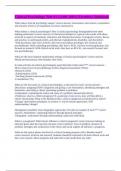Clinical Psychology Test #1 || with 100% Errorless Solutions.
What makes clinicial psychology unique? correct answers Assessment, intervention, consultation
and research. There is an integration of science and practice.
What defines a clinical psychologist? How is clinical psychology distinguished from other
helping professions? correct answers A clinical psychologist is a person who works with others
involved in aspects of treatment, education, and interpersonal issues. It integrates science, theory,
and practice, to understand predict, and alleviate maladjustment, disability, and discomfort.
-With psychiatry, they have an M.D., they have prescription privileges, less research, less
psychotherapy. With counseling psychology, they have a Ph.D., but less severe populations, less
focused on research. With clinical social work, they have an M.S.W., not research focused, and
less psychotherapy.
What are the most frequent employment settings of clinical psychologists? correct answers
Mostly private practice, then hospital, then clinic.
In what activities do clinical psychologists spend the bulk of their time?*** correct answers -
Direct clinical service (psychotherapy (34%), diagnosis/assessment (15%)).
-Research (14%)
-Administration (13%)
-Teaching (formal coursework (10%))
-Consultation (7%)
What are the four tasks of a clinical psychologist, as discussed in class? correct answers -
Discussion: assigning DSM-5 diagnoses and giving a case formulation, identifying strengths and
limitations, describing a clients' presenting problem or problems.
-Explanation: explaining the nature and cause of a problem, theoretically-driven.
-Prediction: what is a client's prognosis? If a particular event occurs, how will that affect a
client's functioning? What is the likelihood that a client is dangerous to him/herself or others?
-Change: intervention techniques, in-session vs. out-of-session approaches. Self-
understanding=change?
Distinguish nomothetic from idiographic approaches. Provide an example of each.*** correct
answers -Nomothetic: explaining behavior through general principles.
-Idiographic: explanation through understanding a particular individual.
What is a prognosis? What factors influence a client's prognosis? correct answers making an
educated guess abut the expected outcome of any treatment. Type of problem, duration of
problem, strengths and weaknesses of the client, and social support all influence a prognosis.
What are the typical phases involved in a clinical training program with a Boulder model?
correct answers -Practice and research. Students should be expected to do both clinical work and
their own research. More programs still subscribe to this model than any other.
, Where are some settings in which a psychologist-in-training might complete a predoctoral or
postdoctoral internship?****** correct answers VA hospitals, academic medical centers,
community medical centers, and college counseling centers.
What additional steps, after obtaining the Ph.D. or Psy.D. degree, are required for licensure?
correct answers -Getting licensed: Examination for Professional Practice in Psychology.
Standardized multiple choice exam.
Distinguish the Boulder model from the Vail and Clinical Scientist models of training. correct
answers The Boulder model focuses on practice and research. The Vail model focuses mostly on
practice, and applied clinical skills, less on research.The Clinical Scientist model focuses on
mostly research and the scientific side of psychology. Strong emphasis on scientific method and
evidence-based clinical methods. Has a separate accreditation process.
What are some ways that successful applicants to clinical psychology programs distinguish
themselves from other applicants?****** correct answers
What are the steps involved in gaining admission to a clinical psychology graduate program?
****** correct answers
What is a Psy.D. degree, and how does it differ from a clinical psychology Ph.D. degree? correct
answers A Psy.D. focuses more on clinical practice and less on research. It is a doctor of
psychology degree.
Know the major figures associated with the profession's development of assessment and
intervention techniques. correct answers -Emil Kraepelin (Germany) defined psychiatric diseases
as either "endogenous" (coming from within) or "exogenous" (externally caused).
-Early pioneers and reformers (Dorothea Dix, William Tuke, etc.) advocated for humane
treatment.
-Lightner Witmer started the first psychology clinic (and journal) at the U. of Pennsylvania in
1907.
-Francis Galton (studied heredity, sensory and motor differences, developed the concept of
correlation, but also promoted eugenics). Emil Kraeplin (early diagnostic system
(exogenous/endogenous, dementia praecox, manic depression)).
What was the difference between neuroses and psychoses, as conceptualized in early eras of
clinical psychology? correct answers Neurosis: suffering from some psychiatric symptoms but
maintaining an intact grasp on reality.
Psychosis: a break from reality in the form of hallucinations, delusions, or grossly disorganized
thinking.
Why has the DSM incorporated so many new disorders in the most recent editions? correct
answers -Potentially creating more mental disorders. Or the thresholds for having a disorder
became too low.




